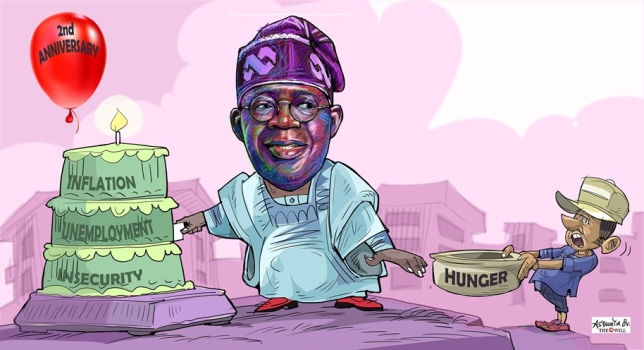May 25, (THEWILL) – On Thursday, May 29, 2025, the Bola Ahmed Tinubu Administration would have completed two years in office. That is, two years shy of his constitutionally mandated four-year tenure.
During his inauguration on May 29, 2023, the President unveiled a policy framework named Renewed Hope Agenda, with key areas of focus as defence and internal security, job creation, macro-economic stability, improved investment environment, human capital development, poverty reduction, and social security.
Not much was accomplished in the President’s first one year in office, thereby compelling him to reshuffle his cabinet for the purpose of injecting capable hands and fresh ideas in September 2024.
Seven new ministers were employed to replace those sacked, while three were redeployed. The seven ministers are Bianca Ojukwu (State, Foreign Affairs); Dr Nentawe Yilwatda (replaced suspended Betta Edu as Minister of Humanitarian, Affairs and Poverty Reduction); Muhammadu Maigari Dingyadi (Labour and Employment); and Dr Jumoke Oduwole (Industry, Trade and Investment). Others are Idi Mukhtar Maiha (Livestock Development), Yusuf Abdullahi Ata (State, Housing and Urban Development); and Suwaiba Said Ahmad (State, Education).
The six that were redeployed are Dr. Yusuf Tanko Sununu, former Minister of State, Education, redeployed as Minister of State, Humanitarian Affairs and Poverty Reduction; Dr. Morufu Olatunji Alausa, Minister of State, Health, now Minister of Education; Bello Muhammad Goronyo, Minister of State, Water Resources and Sanitation, now Minister of State for Works.
Others are Abubakar Momoh, former Minister of Niger Delta Development, now Minister of Regional Development; Uba Maigari Ahmadu, Minister of State Steel Development, now Minister of State, Regional Development; and Dr. Doris Uzoka-Anite, Minister of Industry, Trade and Investment, now Minister of State, Finance.
OFFICIAL VIEW
Expectedly, the government has given itself a pass mark with a crowning moment involving the endorsement of President Bola Tinubu as the sole candidate of the party in the forthcoming 2027 General Election, by governors and lawmakers elected on the platform of the governing All Progressives Congress, APC, and some sympathisers in the opposition Peoples Democratic Party, PDP, notably the three Senators from Osun State – Senator Kamarudeen Oyewumi (Osun West), Senator Olubiyi Ajagunla (Osun Central), and Senator Francis Fadahunsi (Osun East).
At the one-day APC summit with the theme “Renewed Hope Agenda: The Journey So Far,” held at the Banquet Hall, State House, Abuja, last Thursday, Minister of Information and National Orientation, Idris Mohammed summarised the government’s success story so far.
According to Idris, President Tinubu remains committed to transforming Nigeria through the Renewed Hope Agenda, which he described as a bold, people-first blueprint that is turning obstacles into opportunities.
“The Renewed Hope Agenda is about positively impacting the lives of the people of Nigeria, through bold decisions designed to unleash the full scale of Nigeria’s potential, in a way that has never been seen or done before”, he said.
Idris recalled that President Tinubu inherited a nation at a crossroads and immediately moved with clarity and courage. “Among the first decisions the President made were the removal of petrol and foreign exchange subsidies, which have been amongst the biggest impediments to Nigeria’s progress, costing us billions of dollars in losses and waste annually.”
The minister noted that “true leadership involves the ability to make decisions that might be tough in the short term but are guaranteed to deliver lasting returns.”
THEWILL EDITORS’ VERDICT
We believe that two years in the life of this government which promised to renew the hope of Nigerians through sectoral reforms calls for a mid-term assessment that serves as a measure of how Nigerians are faring under the administration.
How has the federal government’s policies impacted the lives of Nigerians in these past two years and what are the opportunities out there for citizens?
These are the questions that prompted THEWILL Editor’s decision to embark on this assessment of the Tinubu administration. In making this review, we chose some critical areas that govern the lives of Nigerians. They are roughly Security, Power, Governance and Inflation.
SHINING STARS IN GOVERNMENT
Some appointees of President Tinubu have been doing remarkably well and earning accolades for their outstanding service. Minister of Aviation and Aerospace Development, Festus Keyamo, SAN, “whose exceptional leadership, bold reforms and tireless dedication to service has repositioned Nigeria’s aviation sector as a beacon of excellence across Africa,” according to the Airline Operators of Nigeria, AON, congratulating him on his recent appointment as Chairman of the Council of Ministers of the Banjul Accord Group (BAG)—a coalition of seven West African countries committed to the advancement of civil aviation in the sub-region. Minister of Interior, Olubunmi Tunji-Ojo, Minister of Works, Dave Umahi, Minister of the FCT, Nyesom Wike, Minister of Solid Minerals Development, Dele Alake, Minister of Communications, Innovation and Digital economy, Bosun Tijani and Minister of Health, Muhammad Ali Pate.
GOVERNANCE AND INFLATION
While the numbers point to “substantial progress”, the impact has left most Nigerians in severe hardship and poverty.
Political Economy professor at the University of Lagos, Sylvester Odion Akhaine, told THEWILL on Thursday that the Federal Government has set some major reforms that may transform the fiscal landscape for good but must revise other measures that may prove counterproductive.
“The tax reform, in my opinion, is ambitious. If truly implemented, it will turn out to be the most far-reaching fiscal policy ever. Two, the war against terror peaked initially, but there is a resurgence. The President needs to double down with clear objectives,” he said, adding that, “There is a slide towards authoritarianism. Such laws aiming to scrutinise social media are counter-productive to the tenets of liberal democracy. He should revise the trend and entrench freedom of expression and association.”
Similarly, the monetary policy authorities have been celebrating the gains of economic reforms resulting in macroeconomic stability.
In the words of Dr. Olayemi Cardoso, Governor of the Central Bank of Nigeria, “Our foreign reserves now exceed $38 billion, providing nearly ten months of import cover”.
Furthermore, “In 2024, Nigeria recorded a balance of payments surplus of $6.83 billion, the strongest in many years, driven by rising exports and renewed capital inflows. Nigeria is increasingly recognised as a rising economic force, admired for the resolve shown in implementing difficult but necessary reforms”.
Some outlooks add to this euphoria: oil production is at 1.6mbpd as against 1.18 mbpd prior to President Tinubu’s inauguration. The NGX market capitalisation which stood at N30.36 trillion has jumped to N68.75 trillion.
Nonetheless, the verdict is still stark.
The World Bank has said that nearly half of Nigeria’s population is now living in poverty as inflation continues to outrun the purchasing power of the country’s minimum wage.
This was stated in the World Bank’s May 2025 Nigeria Development Update (NDU), released in Abuja on Friday, May 21, 2025, disclosing that 46 percent of Nigerians, about 107 million people, were living below the international poverty line of $2.15 per day in 2024, even as the country boasts of being Africa’s largest economy.
Nigerians are bleeding profusely from the injuries inflicted by the removal of fuel subsidy which pushed the pump price of petrol from N230 per litre in May 2023 to N880 per litre in May 2025. Additionally, the naira dropped from N467/US1 on the official window in May 2023 to N1,600/US$1 as of May 2025.
There is no doubt that PMS, diesel and other fuels that drive the economy are available because of the removal of petrol subsidy but the price being paid by Nigerians as a result is affecting their livelihood daily. Transportation fare has risen progressively in the past two years and cost of living too has skyrocketed.
For example, bus fares from Lagos to Abuja have increased from N8,000 two years ago to N55,000, an increase of over 600 percent. Lagos to Benin has increased from N3000 to N25,000 about 700 percent increase and Lagos to Owerri has increased from N27,000 to N55,000, a 100 per cent increase. As an economy that relies on oil and petroleum products, the impact of this increase on inflation has been devastating for many households. Fair enough, the government last year signed the Minimum Wage Act, 2024 into law, increasing the minimum wage to N70,000. But as at May 25, 2025, 20 out of 36 states have commenced payment of the new wage and many are yet to implement the payment across board.
Nigeria Union of Local Government Employees, Alhaji Haruna Kankara, told THEWILL in a recent interview that about 20 states have yet to implement the N70,000 new minimum wage for local government workers and primary school teachers. He said that the government was playing politics with the wage increase, while saying that the union will continue to dialogue with the Ministry of Finance, the Attorney-General of the Federation and the Central Bank to resolve the issue.
A Lagos State teacher, who gave her name as Mercy Akiefa confided in this newspaper that the “new wage is insufficient to cater for transportation and proper feeding let alone pay school fees and health care.” The Federal Government of Nigeria implemented a rice subsidy program to provide 50kg bags of rice to states at a subsidized price of N40,000 per bag. This initiative aims to address rising food costs and food insecurity in the country and is still to address the hunger in the land. The Compressed Natural Gas, CNG initiative that government introduced as alternative source of energy was initially hailed as good, but the cost of installation and easy availability of filing stations has made it slow to adopt.
Moreover, the national debt burden of N77 trillion in May 2023 has risen to N142 trillion with a huge impact on the fragile economy as an average of $500 million is used to service the nation’s debt per month.
Speaking at the 15th Alpha Morgan Economic Review Webinar on Wednesday, May 21, the CEO of Financial Derivatives, Bismark Rewane, stated that while reasonable stability has been achieved in the economy, Nigerians should brace for tougher days ahead arising from high cost of energy, devaluation of the naira and impact of insecurity.
Tilewa Adebajo, CEO of the CFG Advisory, said that the outcomes from the reforms taken by Nigeria in the last 18 months has caused significant hardship at the micro level, stressing that the right policies must be put in place to help grow the economy at a sustainable level. Nigeria’s current 3.83 per cent GDP growth, although higher than 2.31 per cent recorded in 2023, is a far cry from what is needed to boost the economy into productivity.
Coupled with these challenges crying for urgent attention, is the mounting insecurity which has claimed thousands of lives since 2023 and displaced hundreds of communities across the country, especially in the food producing Middle Belt region.
However, the deliberate intervention of government in the petrol price war between the Nigeria National Petroleum Company Limited, NNPCL, and Dangote’s refinery and the presidential directive for the later to pay for supply of crude oil in naira, which has restored regular supply of PMS, is praiseworthy. It shows what can be done with the right political will.
Moreover, the government has also scored some achievement in managing to get NNPC refineries back to production, no matter how skeletal and opaque their production volume is today. As part of measures to empower the sector to deliver improved services, the President sacked the Mele Kyari led management of the NNPCL and appointed a new management led by Bayo Ojulari, a respected multinational oil executive.
INSECURITY
Despite regular information released by the Defence Headquarters about the impending defeat of terrorists, insurgents and bandit, the fact remain that large swathes of the country, particularly in the Northeast states of Borno and Yobe State, almost all the seven states in the Northwest, particularly Zamfara, Kaduna, Katsina, Sokoto and Kebbi as well as Niger, Benue and Plateau in the Northcentral geo-political zones are still bleeding from bloodshed in huge numbers. What is worse, farming and business activities have been negatively impacted by the activities of the daredevils.
Even soldiers have become targets of the terrorists. Ransom payments by Nigerians have also increased. The National Bureau of Statistics (NBS) reported that in Nigeria, between May 2023 and April 2024, over 614,937 deaths were recorded due to insecurity. Additionally, 2,235,954 Nigerians were kidnapped, and a total of N2.23 trillion was paid in ransom. It is arguable if there has been significant improvement, one year after. In fact, Borno State governor, Babagana Zulum painted a sad picture last week when he claimed that internal saboteurs that act as “informants and collaborators within the Nigerian Armed Forces, within the political class, and within local communities”, have sabotaged the war against insecurity. Given that the constitutional mandate of any Nigerian government is the protection of the people and the provision for their welfare, THEWILL Editors strongly believe that the government needs to demonstrate capacity and capability to protect the citizenry. As an urgent measure to tame insecurity, political, religious and traditional rulers from all the geo-political zones in the country have agreed with the intention of the President and governors to introduce state police. What is holding the government back?
ELECTRICITY:
According to the National Bureau of Statistics, electricity supply was 5,909.83GWh in Q2 2023 but dropped to 5,769.52GWh in Q1 2024; 5,612.52GWh in Q2 2024 and 5,713.60 GWh in Q1 2025. Surprisingly, the government appears helpless in tackling the electricity challenge.
For a government that has tried to manage electricity through measures like the classification of consumers into bands based on ability to pay and the recent new initiative to power Aso Rock from massive solar installation, speak to the frustration of the government to remedy the situation.
Speaking at a two-day retreat organised by the Senate Committee on Power last week, the Minister of Power, Adebayo Adelabu, said that “chronic underinvestment in distribution infrastructure has continued to cripple service delivery nationwide despite landmark reforms in the electricity sector.”
He blamed the Distribution Companies, DISCOS, for frustrating all the gains the government has made in the power sector, saying “they have disappointed the government with poor performance.”
A major player in the electricity sector, Tony Elumelu, also the Chairman of Heirs Holdings, said that stable electricity and improved security are critical keys to attracting investments to Nigeria.
Elumelu, who spoke last Wednesday at the Taraba International Investment Summit in Jalingo, organised by the Taraba State government, said, “Improving access to electricity is so critical in attracting and supporting investments in the country. Improving the security also helps, and most importantly, ease of doing business.”
Government should therefore think out of the box on this obviously vital factor in economic development and generate the required political will to resolve the infrastructural deficit in electricity supply because without an efficient and effective power supply, Nigeria’s productive and manufacturing capacity may stagnate.
Infrastructure constraints across the entire value chain from fuel to power distribution link, including insufficient gas pipelines, obsolete generation plants, and equipment, as well as inadequate and poorly maintained transmission and distribution networks should be the focus in the next two years of the administration. A new world of technology such as AI, robotics, coding, machine use and transfer of technology to Africa depends on electricity. Nigeria has abundant and varied means of generating electricity, namely solar, water and wind. These are areas waiting for massive investments.
VIEWS FROM ACROSS THE STATES
Recounting the terrible insecurity situation in Benue state, which appears to have defied intervention, the Tiv Traditional Council led by James Ortese Iorzua Ayatse issued a directive, ordering herders to vacate farmlands across the Tiv Kingdom, to allow for full-scale resumption of farming activities. The affected areas include Kwande, Katsina-Ala, Logo, Ukum, Guma, Makurdi, Gwer West, Gwer East, and Buruku.
Speaking to our correspondent in Makurdi on Friday, several farmers, including the State Coordinator of Sustainable Agriculture in Benue, Mr. Aondona Saaku, said the directive is timely, given the threat posed to food security by the continued occupation of farmlands by herders.
Saaku said the move was in the best interest of both parties and urged herders to comply with the order to avoid further tensions in the affected communities.
“This directive is timely and necessary. If the herders vacate these lands peacefully, everyone stands to benefit. Farmers will return to their fields, and herders can seek alternatives without conflict,” he said.
He added that many Benue farmers had been displaced and forced into Internally Displaced Persons, IDP, camps due to violent attacks by invading herders, many of whom, he claimed, do not even speak the Fulani language familiar to residents.
Saaku, a former State Chairman of the All Farmers Association of Nigeria (AFAN), also noted that Benue farmers have historically practiced ranching, especially during the rainy season, and called on the herders to comply with the eviction directive.
Similarly, a member of the Association of United Farmers Benue Valley (AUFBV), Mr. John Upulugh, commended the Tiv Traditional Council for what he described as a long-overdue intervention.
He noted that the Tiv people in Benue, Nasarawa, and Taraba states had been displaced from their ancestral lands over the years due to herder-related attacks, which has prevented them from farming.
Responding to a question from THEWILL, Dr Ashiekpe noted that the Defence Headquarters Operation Whirl Stroke (OPWS) need to be expanded to cover the entire state, including the deployment of mobile police men in strategic locations with intensified military-led joint task force operations targeting bandits, kidnappers and other criminal elements in Benue, especially in border communities and neighbouring states, would greatly checkmate the insecurity problems in the state.
According to him, forward Operating Bases that have also been established in conflict-prone areas of Agatu, Ohimini, Guma, Logo, Katsina-Ala, and Ukum would go a long way to deter and reduce the spate of attacks.
Comrade Yinka Folarin, the National Vice President, Committee for the Defence Human Rights (CDHR), told THEWILL in Abeokuta that it would amount to being “economical with the truth if we say that nothing has been achieved by the federal government.”
He said the President has taken some bold steps to restructure the state and to ensure that the country is restored to its old glory of security and much better standard of living, but “To a very large extent Nigerians have been pushed into untold hardship, many lives have been lost as a result and some of the problems inherited by the current government are still very much in existence – the insecurity, the economic situation and poor standards of living of the masses. He has got a lot to do two years down the line, and I want to be optimistic by saying that things will get better.”
Peter Oluwatoyin Adekunle, Capon, Ash Montana Deck, Abeokuta Chapter of the National Association of Seadogs ‘Pyrates Confraternity told THEWILL that the government’s claim of performance contradicts realities in the lives of many Nigerians.
“Public sentiment, as reflected in surveys like the National Bureau of Statistics which said food inflation is as high as 40 percent and 84 percent of citizens expressing dissatisfaction in a 2024 Africa Polling Institute (API) survey as well as X posts, show public frustration with the lack of tangible improvement,” he said, adding that, “The removal of subsidies and floating of the naira, while aimed at long-term economic stability, have not been accompanied by sufficient measures to cushion immediate impacts, leading to widespread discontent.”
The major problem, he further said, was that economic reforms have prioritized long-term goals over immediate relief, leaving most Nigerians struggling. That is why “the administration’s focus on macroeconomic indicators has not yet translated into tangible improvements in living standards.”
POLITICKING FOR 2027
Last week the various groups within the governing APC fell over one another to endorse the President as the sole candidate of the party in the 2027 general election. The groups are the Progressives Governors Forum led by Governor Hope Uzodinma of Imo State, senior lawmakers elected on the platform of the party and the members of the National Working Committee led by National Chairman, Abdullahi Ganduje. While the party members and officials have the right to endorse the President for a second term, we believe that two years is still a long time for the administration that is yet to achieve a substantial part of the promises it made to the electorate on assumption of office in 2023. It will prove a great distraction to the President if sycophancy and politicking for an election that is still two years away take centre stage barely two years in the life of the administration.
As Professor Akhaine rightly noted in an interview with THEWILL “Unfortunately in the next two years, it is going to be politics and politics. That may affect social policies. So, the President should rather refocus on resolving basic infrastructure problems.”
Going forward he said, the government must tackle head on the “Debilitating poverty made worse by terrorists roaming our forests and making farming difficult.
Amos Esele, THEWILL
Amos Esele is the Acting Editor of THEWILL Newspaper. He has over two decades of experience on the job.
Sam Diala, THEWILL
Sam Diala is a Bloomberg Certified Financial Journalist with over a decade of experience in reporting Business and Economy. He is Business Editor at THEWILL Newspaper, and believes that work, not wishes, creates wealth.
Sunday Ogbu
Sunday Ogbu is a professional journalist with eight – twelve years experience that had worked with various print and online media. Sunday specializes in news reporting with the aim of educating his readers on current social, political and economic occurences within his area of coverage. Sunday is a strong force to work with in the media industry and uses his positive attitude and tireless energy to encourage others to work hard and succeed. Sunday is inspired daily by his wife and their four children. In his free time, Sunday likes sight-seeing, reading and discussing issues of societal interest.








